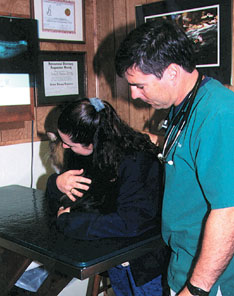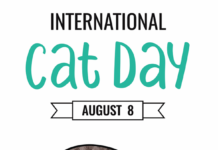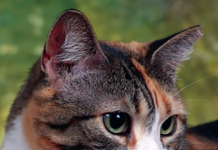Veterinarians love animals. They chose the profession because they want to help animals, and when one of their patients dies, they often experience grief not unlike what the pet owner feels. Whether death is sudden or follows a long illness, veterinarians grieve for their lost patients.

234
Sometimes a veterinarians grief is compounded by the loss of several animals, especially in emergency work. This is the most difficult. You see so many critical cases that either you cant save or [owners] cant afford to save, says Barbara Gores, DVM, of Arizona Veterinary Surgery in Tucson, Arizona. You might euthanize four or five animals during an ER shift. It might be the only choice or the right thing to do to end suffering, but you walk home thinking, I just killed four animals… You save life, but you can also take it away.
However, I do tell people that euthanasia is one of the most beautiful gifts you can give your pet, Dr. Gores continues. Veterinarians commit to care for animals and preventing their suffering; and in many ways euthanasia is the kindest and best way to end the suffering.
Deb Eldridge, DVM, of Burrstone Animal Hospital in New Hartford, New York, agrees.
Every euthanasia hurts at least a little, even when theres absolutely no question it is the right time and the right thing to do. I also feel that its a privilege: When the quality of life is gone, when we can no longer keep an animal friend comfortable and happy, we can at least end any suffering, says Dr. Eldridge. It is the final act of love and caring.
According to William Fortney, DVM, of Kansas State University, I try to keep the pets feelings first. I end up being the advocate for the pet. With cases of ongoing terminal illness, Ill be very upfront about whether I feel the client is treating the pet more for his own needs and has lost sight of the pets needs, says Dr. Gores.
People can become so emotionally bonded to their pets that they are sometimes unable to make rational decisions that are best. From the veterinarians perspective, its always quality of life over quantity.
I sometimes go through Kubler-Rosss five stages of grief, says Dr. Fortney: shock, anger, bargaining, depression and acceptance. It does not get easier. I think I adapt better and respond in a more appropriate fashion, but honestly, it doesnt get any easier, he states. I think the most frustrating is the unexpected anesthetic death.
He recalls a little dog who died while being X-rayed for a broken jaw. Thats probably 20 years ago, and Ill never forget the whole scenario. Dr Gores agrees. The unexpected death: Those are the worst by far. Ive awakened in the middle of the night thinking about cases. I want to save them all, but I cant.
Some Coping Methods
Dr. Fortney feels that his best method for coping with grief is to talk about the case with students or other faculty members. Were always trying to second-guess ourselves: Did we do the right thing? If I had to do this over, what should I have done? Having the reassurance that I did the best thing possible – and it just didnt turn out well – gives me a sense of closure, he adds. Very often [in veterinary school] the emphasis is more on helping your clients through grief than how to cope yourself, says Dr. Eldridge. Dr. Fortney thinks the topic of veterinarians handling their own grief may be a worthwhile presentation at a future veterinary conference.
Some coping mechanisms shared by veterinarians are to talk with the client and/or colleagues and share feelings over the loss; send a sympathy card or write a personal note to the client; make a donation in the name of the pet; write a letter to yourself as if written by the pet; or send a memento or a photo. Spending time with another pet in the hospital helps a lot, too.
A wagging tail or a purring cat is very therapeutic in itself. You just go back to the essence of why youre doing what you do, says Dr. Gores. Happily, the end result is that these coping mechanisms end up helping everyone: clients, veterinarians and staff.
When one of Dr. Eldridges favorite, long-term feline patients died, it was just horrible, as if one of my own pets had died. Her owner and I just stood there holding each other and sobbing, she says. The grief and the comfort absolutely go both ways, no question about it, adds Dr. Eldridge.



